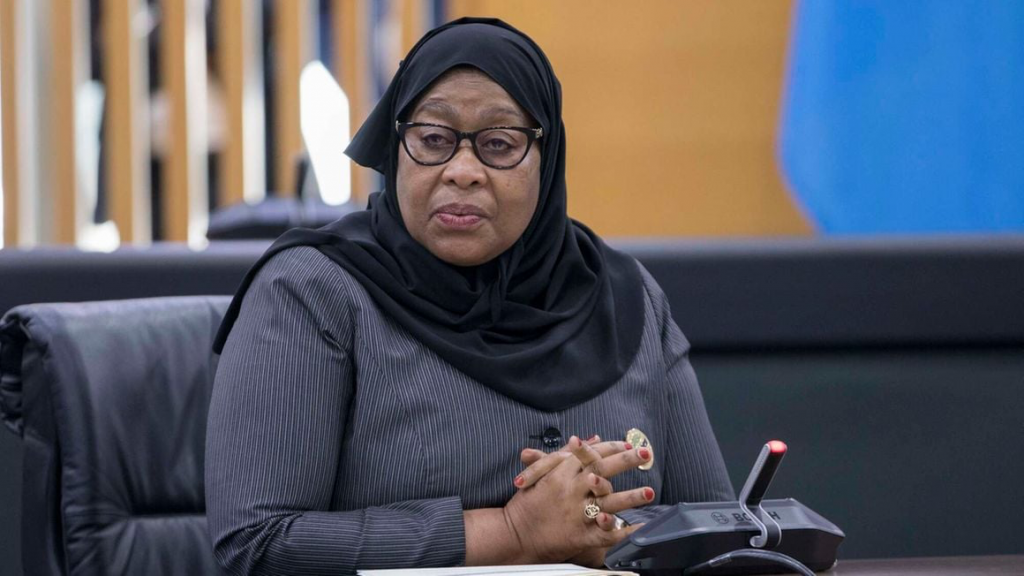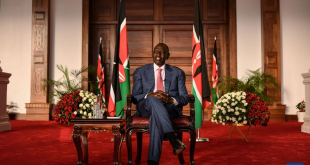Published: May 28,2024

Tanzania’s President Samia Suluhu Hassan. PHOTO | POOL
President Samia Suluhu Hassan will visit China in September for the Forum for China-Africa Cooperation (Focac), where she is expected to sign new loan deals as Tanzania begins to implement a freshly revised foreign policy.
According to the Ministry of Foreign Affairs and East African Cooperation, China confirmed its willingness to enter into new project sponsorship pacts with Tanzania during a working visit by Minister January Makamba to Beijing last weekend.
The ministry said in a May 19 statement that MrMakamba held talks with the director of China’s International Development Cooperation Agency (CIDCA) Luo Zhaohui as part of his mission to lay the groundwork for Ms Samia’s visit.
It quoted Mr Luo as saying there was a “high probability” that President Samia would ink several new strategic aid agreements while in the China capital for Focac involving heads of State, cabinet ministers and other senior government executives.
“I can pledge that we will finance the next phase of our bilateral projects that are already underway in Tanzania along with new strategic projects that you have requested,” the CIDCA chief stated.
The Focac conference, which was first held in 2000, incorporates 53 African countries with the exception of Eswatini. This year’s event ends a hiatus of three years since the last one in Dakar, Senegal in 2019, and is expected to be attended by many African leaders as China seeks to expand its footprint across the continent further.
Ms Samia’s only previous visit to Beijing as Tanzanian president was in November 2022 when she was the first African leader invited by President Xi Jinping after his re-election as general secretary of the Chinese Communist Party for a third term.
A total of 15 bilateral agreements were signed during that trip covering, among other areas, an upgrade of the Chinese-built Tanzania-Zambia Railway (Tazara), a Tsh31.4 billion ($13.49 million) debt waiver under a new economic and technical cooperation pact, and duty-free access to China for up to 98 percent of Tanzanian products including avocado fruits and wild aquatic products.
Beijing also agreed to provide a $56.72 million concessional loan for a new terminal at Zanzibar’s International Airport and China-Tanzania relations were elevated to a “comprehensive strategic cooperative partnership”, generally regarded as China’s highest diplomatic level of country-to-country engagement.
Other new pacts focused on boosting investments, production capacity cooperation and industrial “complementarity” in areas such as energy and minerals development, processing and manufacturing, green development and digital economy; cultural and tourism promotion, health, education, sports, academic and media exchanges, curbing transnational crimes, and mutual citizens protection on both sides.
China said it would encourage more of its companies to invest in Tanzanian infrastructure including railways, roads, ports, aviation, electricity and information and communications, and also agreed to facilitate Tanzanian firms to trade and invest with similar success on its territory.
The timing of President Samia’s 2022 visit coincided with a fresh move by Beijing to reboot its Belt and Road Initiative (BRI) for African countries amid growing international concerns that it was becoming a vehicle for debt entrapment.
As such, it triggered fresh speculations that China was trying to restore Tanzania as a key BRI partner following a serious falling out with ex-president John Magufuli over tough loan conditions attached to some projects, particularly the much-touted Bagamoyo Port construction.
Since succeeding the late Magufuli following his unexpected death in March 2021, Samia has led a whirlwind crusade to do away with her predecessor’s isolationist agenda and rebrand Tanzania as a pro-business country for all-comers where political ideologies play second fiddle.
Under her mantle the country has chosen to stay clear of disputes related to world superpower dominance such as the ongoing Russia-Ukraine and Israel-Palestine conflicts, maintaining firm, non-aligned positions on both.
Tanzania’s newly tweaked foreign policy document, which was finalised during a retreat of the country’s international envoys earlier this month, reaffirms this commitment to not taking sides in any international conflict.
“The policy focuses on economic diplomacy to secure the core national interest as a sovereign state and manifests itself in active international engagement which is basically leveraged upon non-alignment and the pursuit of economic objectives, while at the same time preserving the gains of the past,” the foreign ministry explains on its website.
It highlights principles such as safeguarding sovereign and territorial integrity, political independence, and promoting good neighbourliness, African unity, and “deeper economic cooperation with or without development partners.”
The document’s main objectives include “ensuring that Tanzania’s relations with other nations and international entities are also driven in line with economic interests” in order to build a “self-sustaining” economy. It also outlines strategies such as “redefining bilateral diplomacy, strengthening multilateral diplomacy, readdressing external debt” and “cooperating with multinational corporations.”
Chinese companies are Tanzania’s largest single source of foreign direct investments through projects covering transportation, real estate, manufacturing, mining, tourism, agriculture, agro-processing, fishing and others totalling $9.8 billion in value by October 2022.
On the side of direct trade, Tanzania’s export trade figures to China stood at $600 million in 2022 and the country is targeting an increase to $1 billion by 2025.
China’s main imports from Tanzania at present are oily seeds such as soybean and sesame, raw and refined copper, precious metal ores, coconut and other vegetable fibres. In return, Tanzania buys lots of Chinese-made footwear, fabrics, electronic goods and household utensils.
theeastafrican.co.ke
 Africa -China Review Africa -China Cooperation and Transformation
Africa -China Review Africa -China Cooperation and Transformation
